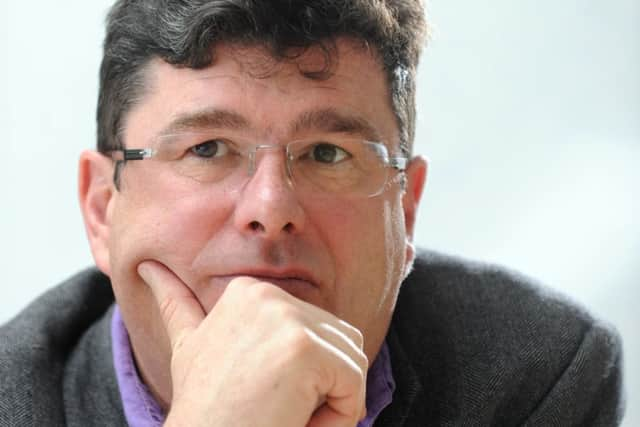Yorkshire Vision: Hi-tech at the heart of health


• This article is from the new issue of Yorkshire Vision, the quarterly business magazine from The Yorkshire Post. Click here to read the entire magazine, exactly as printed
Frank Hester, a technology entrepreneur who is leading efforts to bring the digital revolution to the NHS, understands the fundamentals of construction.
Advertisement
Hide AdAdvertisement
Hide AdHis formative years on building sites would have come in useful when his company set about creating one of the biggest databases in the world.


TPP is a powerful force in the digitisation of the health service, providing electronic medical records for 30m patients.
In terms of scale, it handles a hundred times more transactions a second than the London Stock Exchange; its traffic equates to 10 per cent of Google USA. The business regularly handles 4,000 transactions per second every single day. To put that in context, Visa Europe’s busiest hour of the year peaks at 1,000 per second on midday the Saturday before Christmas.
“We had to build it from the ground up,” says Hester, the 47-year-old founder, chief executive and a veteran coder.
Advertisement
Hide AdAdvertisement
Hide Ad“Nothing existed to do this. The encryption is built from the ground up. Everything is built from the ground up.


“You build a building, you put some glass in, you put some doors in,” adds Hester, who spent his weekends and summer holidays on construction projects around Yorkshire .
“You build a skyscraper, you need different types of glass, you need different types of steel, you need deeper foundations to build bigger things.”
As well as creating vast databases, TPP is making its mark in the physical world; the company is investing £20m to create a new headquarters in Leeds to accommodate the growth of the business.
Advertisement
Hide AdAdvertisement
Hide AdHester says the building will have room for 650 staff, up from 250 at present. “It’s 400 new jobs for Leeds,” he adds.
Founded in 1999, TPP has grown to become a £25m turnover business through the success of its SystmOne product, a secure centralised system which allows patient data to be shared across all health services, covering primary, secondary, community and social care.
“There really isn’t a setting within the NHS where it isn’t important for a doctor to see the full picture of what’s going on with the patient,” says Hester. “A constant theme you hear is patients being frustrated, having to repeat themselves or their notes being lost.
“It is a common problem, not just in the NHS, it is a worldwide problem.”
Advertisement
Hide AdAdvertisement
Hide AdTPP is the dominant player in primary care; it has about half the patient records in England. It wants to expand its presence in secondary and social care.
“We are getting much more support now,” says Hester. “It is now considered an imperative to share the record. It is considered to be a positive thing, rather than a dangerous thing.”
He describes the medical profession as extraordinarily conservative.
“It has to be. It’s safety first. New innovations are looked at very carefully and scrutinised very carefully.”
Advertisement
Hide AdAdvertisement
Hide AdHe is proud that TPP helped break the ground in the approach to the way data is used in healthcare.
Throughout January every home in England was sent a leaflet about the major changes to the way personal information is stored by the NHS.
The care.data programme will see patient records held centrally, with non-identifiable data being extracted and used to assess services and for research.
Aside from expanding in its home market, TPP is looking overseas.
Advertisement
Hide AdAdvertisement
Hide AdHester says he was “amazed and delighted” to be invited to join a trade mission to India with the Prime Minister last February.
The company has since been on a number of trade missions to important growth markets in China and Brazil with David Cameron and other senior ministers.
Its presence on these trips demonstrates the favour with which the Government views this 15-year-old business from Yorkshire, which now holds an important position in the UK health service.
“On a personal level it was a fabulous experience,” says Hester of the India trip.
Advertisement
Hide AdAdvertisement
Hide Ad“We got to meet health secretaries in various states of India and got to make some contacts and talk about what healthcare for India might look like.
“While these trade missions are fantastic opportunities for business, they are also a fantastic opportunity to engage with the Government and senior civil servants about what their vision is, share our vision and compare ideas and where do we want to go with Great Britain’s healthcare?”
Hester explains his own vision.
“This is my opinion. I can see some of the opportunities where technology can help. We do have an ageing population. We have multiple complex health conditions.
“One of the main problems is we keep bringing old people into hospital when they shouldn’t be there.
Advertisement
Hide AdAdvertisement
Hide Ad“So seeing the full patient record and being able to make better decisions based on that is extraordinarily helpful.”
TPP has been piloting an initiative in north Bradford, which Hester says led to a 60 per cent reduction in accident and emergency admissions from elderly care homes.
Examining electronic patient records helps fully inform healthcare professionals about what is normal for a particular person, he adds.
“What is normal for Mum? If you get an on-call doctor turning up, Mum can be exhibiting some behaviour that could be seen as quite serious, when she has been like that for years and it does not need to go to A&E. It’s pretty basic stuff.
Advertisement
Hide AdAdvertisement
Hide Ad“Another challenging problem we have is end-of-life care. We all want to die at home with our loved ones.
“Even if that’s the plan, it’s very difficult when your loved one is coming to the end. It is too easy to call the on-call doctor and for the doctor to admit them to A&E.
“But if the doctor can see the shared record, the doctor can see exactly what’s going on, can see what the wishes are and can help keep the patient at home.”
TPP is owned by Hester and Satvinder Virk, who has left the management but retains a 50 per cent shareholding.
Advertisement
Hide AdAdvertisement
Hide AdHester says an offer is made every week to buy the company, such is its perceived value.
He has no plans to float. “Don’t need the cash,” he says.
Hester has reached this commanding position in business and healthcare from a humble background in Leeds.
His parents were Irish immigrants who settled in Armley in inner city Leeds – “Upper Armley, the same as Alan Bennett” – and started a plastering company, which the whole family became involved.
Hester’s original plan was to become a priest and he went to train at Ushaw college in Durham, but decided it wasn’t for him.
Advertisement
Hide AdAdvertisement
Hide AdInstead, he went to Liverpool Polytechnic to read computer studies.
He recalls his father saying: “What job will you do with that degree? There aren’t any computers around here”. Hester senior was right, at the time.
Hester found work at Halifax Building Society working on the mainframe computer system.
His wife, a doctor, fell pregnant and he needed the overtime so he started working on a project involving PCs, a new fad in those days.
Advertisement
Hide AdAdvertisement
Hide AdHe ended up being part of one of the biggest PC roll-outs of the time and successfully joining up masses of information relating mortgages, insurance and investors.
Meanwhile, he observed from his wife’s work as a GP that healthcare was not joined up. He resolved to do something about it.
He and university friend Satvinder Virk founded TPP in 1999. Their first contract was for a group of 20 GPs in the Worth Valley, to join them to the local diabetes and out-of-hours centres.
“When we started we had little or no support for doing it. We were, in no uncertain terms, told that we shouldn’t be doing it.”
Advertisement
Hide AdAdvertisement
Hide AdNow, however, the digitisation of the NHS is high up the political agenda.
Hester sees a fantastic opportunity for Leeds in the healthcare industry. The city is home to both TPP and its publicly quoted rival Emis.
“It brings focus to Leeds,” he says, adding that the company was delighted to host a visit from Gulf Cooperation Council representatives in October.
The representatives visited Leeds University and Airedale Hospital to see TPP projects in action.
Advertisement
Hide AdAdvertisement
Hide Ad“That was a very proud moment for our country,” says Hester.
He employs staff from Leeds University and has the pick of maths graduates from leading institutions like Oxford, Cambridge, Durham, Warwick and Manchester.
“A lot of the jobs are very high-tech so we do employ from the best universities. Leeds is a very good university.
“People like Leeds. They enjoy coming here and like being here and it is actually an asset having a place like the Yorkshire Dales just here.
Advertisement
Hide AdAdvertisement
Hide Ad“Leeds is seen as a very good place to live. There is a good quality of life.
“We are now of stature where we can get the very best people. I can’t think of a better industry for my hometown and my home county than hi-tech IT.
“It’s hard for us to compete with the volume jobs with India and China, but we can compete in terms of creativity and skill and on the higher end technology.”
He believes that the answer to producing more businesses like TPP lies in education and showing people what is possible.
Advertisement
Hide AdAdvertisement
Hide Ad“My father came from a poor background as an immigrant. I think sometimes immigrant populations really want to prove themselves and achieve. People sometimes don’t believe what’s possible.”
TPP once considered sponsoring a local school to help show children what is possible.
Hester wants to show people that Britain – and Yorkshire – can still do it. “We can and do compete in a world market. We have a reputation for being very down to earth in Yorkshire, very straight forward, and that’s an attractive quality which is recognised throughout the planet. People like it.”
• This article is from the new issue of Yorkshire Vision, the quarterly business magazine from The Yorkshire Post. Click here to read the entire magazine, exactly as printed